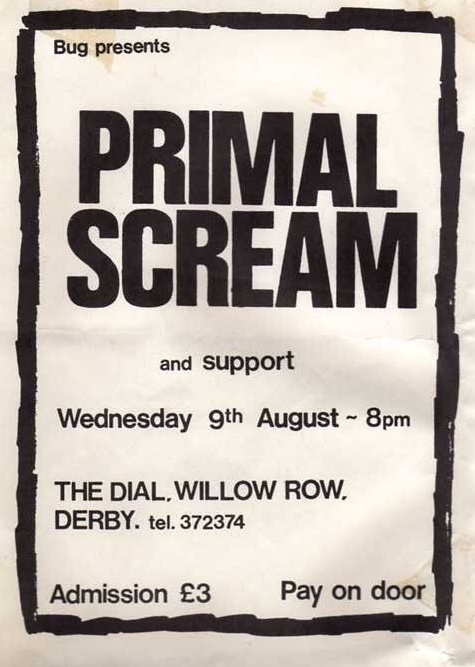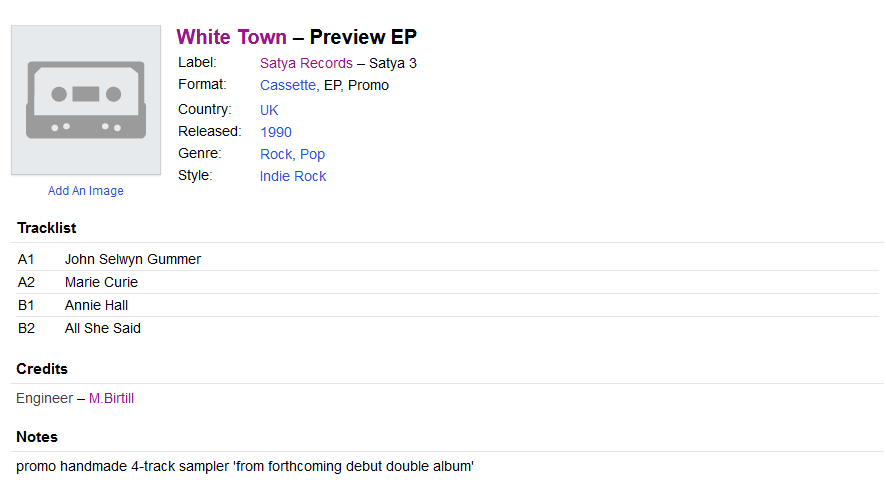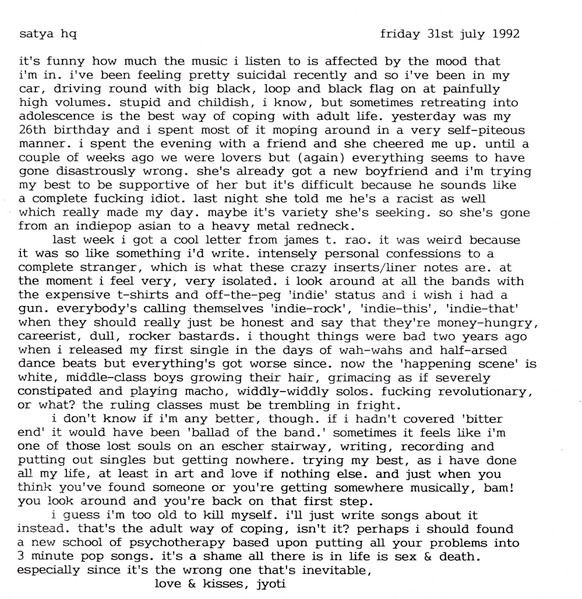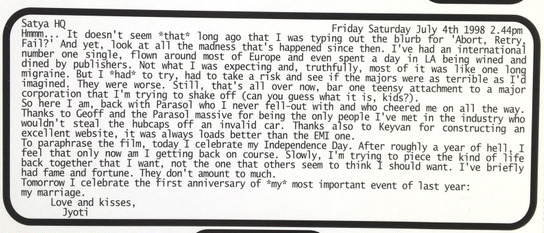A brief history of White Town
Early Beginnings
White Town was started in 1989 by Jyoti Mishra after attending a Pixies gig in '88. As Jyoti put it in his website, "Black Francis was a porker and could get away with playing noisy pop music so maybe I could as well?". While he played keyboards since he was 12, he had almost no experience with guitars but that did not stop him from booking gigs and getting a band together. While, according to him, he "went through around eight guitarists, three drummers and two bassists", the ones that we know of are Sean Deegan (bass), Sean Phillips (guitar), and Nick Glyn-Davies (drums). This lineup presumably supported Primal Scream, The Cateran, among others in 1989 at The Dial in Derby.

Satya Records and the lost first album
In 1990, White Town released a self-titled 3-track 7" single on Jyoti's Satya Records. For the sake of brevity, you can read more about it here. Little info is known about Satya Records, albeit it is known that at least 4 titles were released on the label (going off the catalog number of the last one we know of).
An incomplete overview of Satya Records' catalog
- Satya 1: White Town - White Town [7"] (1990)
- Satya 2: Unknown [Likely a 7"?]
- Satya 3: White Town - Preview EP [Cass] (1990)
- Satya 4: Iris - Business [Cass] (1991)
What most interests me in this catalog is release number 3: Preview EP. I stumbled upon it on Discogs while looking for any information about Satya Records. As of this writing, this is what the page for it looks like.

Curious about the release, I contacted Jyoti during a Twitch stream (which you can check out here) about the release, and according to him its the last release he did "with an actual rock and roll band", with Sean Deegan on bass, Nick Glyn-Davies on drums, and himself on guitar and vocals. He then later confirmed to me what the notes in the Discogs listing suggested: There's an entire album's worth of mostly unreleased material recorded under the White Town name as a whole band, presumably meant to be released under the name Truffaut, should the liner notes of the Daley Abbey flexi-disc - released on Steve Biscuit's Lovely Records - be anything to go off of. Furthermore, he is currently in talks with an indie label about potentially releasing those recordings in some official capacity. However, all in all White Town existed as a group for a total of about six months. While Glyn-Davies and Phillips left after the release, Deegan stayed around for two more records, the aforementioned Darley Abbey and the Alain Delon EP on Parasol Records, before White Town decidedly became a solo effort in 1991.
Socialism, Sexism & Sexuality
The following year saw the release of two more records: the Fairweather Friend EP (the namesake of which is the namesake of this very website), released on spanish label Elefant Records, and the Bewitched EP, the third White Town release on Parasol Records. Despite now being a solo effort, Jyoti gave himself the (admittedly harder back then than it is now) task of maintaining a similar guitar-centric Pixies/Sonic Youth/Wedding Present-inspired sound to the one he had established during the group era. The liner notes of every record up to this point have included hand-typed notes from Jyoti, often reflecting his mental state at the time and talking about the songs of the record and the world around him. While I obviously cannot speak for Jyoti at the time, going off of what he wrote, often talking about his suicidal musings and feelings of loneliness, it is safe to say that this post-group period was a dark time in his life, which likely influenced songs with titles such as "An Idiot Sings" and "I Just Want to Die". Four of the songs from these EPs, along with several others released through seemingly random obscure various artists compilation albums, would eventually find their way onto White Town's first proper album, Socialism, Sexism & Sexuality, released on Parasol Records like much of his catalog up to that point.

The myth of White Town's shift in sound
Among all five or so White Town afficionados, the "common tale" of Jyoti's move from guitars to synths is that it only happened after he had released Socialism, Sexism & Sexuality in 1994. However, during my research I came upon a surprising revelation - several songs from Women in Technology were actually recorded before even the first album was released! The songs "Give Me Some Pain" and "Undressed" were at first released on Beyond the Valley of the Polar Bears, while "The Shape of Love" and "The Death of My Desire" were on From the Derwent to the Garonne. While I'm yet to find a copy of the latter, I can confirm that the tracks on the Polar Bears tape are the exact same arrangements later present on Women in Technology! I later brought this information to Jyoti's attention, to which he responded:

And my ego has never been tempered since. /s
Abort, Retry, Fail?_ & The First Bedroom Pop Hit
It should come as now surprise at all, you see, that if you ask anyone what they know White Town for (or, more likely, what you yourself will bring up once they don't recognize the name) nine-hundred and ninety-nine times out of a thousand it'll be because of the Imperial March-sounding trumpet sample that serves as the main riff to White Town's one and only chart hit, "Your Woman". The story of how the song came into being is one that was told very nicely by both the man himself and Todd in the Shadows' video so in order to minimize the amount of information I mindlessly regurgitate, I'll be admittedly brief during this section.
Abort, Retry, Fail?_ was a 4-track EP released by Jyoti under Parasol Records after giving up on his old guitar sound for good and deciding to go all in on synths and samples as his instruments of choice. The EP and subsequent Women in Technology album was recorded primarily with an 8-track cassette recorder, an Atari ST and a couple of old synths (you can read about the exact equipment used here). The EP, along as the track "Your Woman", featured the song "Give Me Some Pain" with Rob Fleay on guitar, and two "Theme For..." instrumentals ("Theme for a Mid Afternoon Game Show" and "Theme for a Late Night Documentary About the Dangers of Drug Abuse"), which would become a running "series" throughout his various releases over the years. The album Women in Technology, released by EMI's Chrysalis label after the radio success of "Your Woman", included "Theme for an Early Evening American Sitcom", the third "entry" in the series from my count.
Jyoti's time with EMI's Chrysalis label would be (rather fortunately) brief. The label released two more singles off of the album, "Undressed" and "Wanted", which didn't do quite as well as expected. That, added onto the their uncertainty of how to market White Town and Jyoti's own jadedness with the chart success and major label life, led to him getting very quickly dropped, and White Town never worked with a major label since.
Return to Indies
The year after being dropped by EMI, Jyoti wasted no time in returning to Parasol with a new release: the Another Lover EP. The liner notes to that release are likely one of the best documents we have of how Jyoti felt about the experience of the year prior, expressing his contempt with working with a major label and his joy and relief to be back to working with indie labels once again.

The title track of the EP would later be included on the album Peek & Poke in 2000, the first to be released on Jyoti's own Bzangy Groink label, distributed by Voiceprint. Over the next 20 years, Jyoti would sporatically release albums, EPs, and singles, (notably Don't Mention the War in 2006 and Monopole in 2011) eventually dropping the Bzangy label and self-releasing records digitally, starting with 2015's The Barren Seas EP. A solid 8 years would pass between his fifth album, Monopole and his sixth Deemab in 2019, which collected several songs he's recorded, some released as singles, since at least as far back as 2014. Also in 2019 he released a concept album called Polyamory, a collection of songs about his experiences in a polyamorous relationship. His most recent release, safe for a few loose singles and an acid house EP released in 2023 (creatively titled 2023 Acid EP), is 2021's Fairchild Semiconductor, an imagined soundtrack for an imagined TV series about the electronics company that the album is named after.
Where is White Town now?
Unless he died or some major life-changing event that nobody could've predicted happened, Jyoti is still living life, making music, frequently streaming on Twitch and being active on Mastodon and whatnot. The story of White Town is fascinating not necessarily because of the man himself (although something could be said about how he seems to transcend the usual generational divide when it comes to both virtual and sociopolitical literacy, despite him being, in his words "an old man" at a ripe years of age), but rather because of how a seemingly ordinary guy with a passion for music, equipped with almost nothing but a computer and an 8-track in a 9' by 9' spare bedroom, for a brief moment in history, conquered the world.